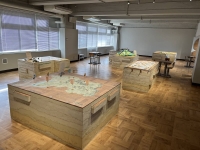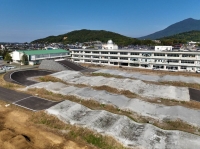The Ibaraki city of Tsukuba in November launched a new facility, Mt. Tsukuba Gate Park, that focuses on promoting the charms of the Mt. Tsukuba Area Geopark and supporting Japan’s cycling culture. City officials stationed there explained what the facility offers and how they aim to nurture the civic pride of local residents and their children.
Mt. Tsukuba Gate Park comprises Tsukuba Geo Museum and Cycle Park Tsukuba. The museum, housed in the building of the former Tsukuba Higashi Junior High School, which was closed six years ago, showcases local products and industries that are supported by the area’s natural, geographical and geological characteristics.
Ibaraki is known for the Mt. Tsukuba Area Geopark, which extends across six cities, including Tsukuba. It is one of the 46 Japanese geoparks certified by the Japan Geopark Committee. Three distinctive features of the geopark — Mount Tsukuba, Lake Kasumigaura and the Kanto Plain — provide scenic beauty and abundant natural resources.
In the main exhibition room of the museum, visitors receive three cards at random, each with a question related to the geopark, such as “What was constructed on Mount Tsukuba to prevent landslides?” All the answers to the 39 cards are hidden somewhere in the six installations displayed in the room. The installations are interactive, with gamification features such as a board game and pinball. A three-dimensional puzzle represents the rock composition and vegetation distribution of Mount Tsukuba, and a sandbox with kinetic sand helps visitors understand the shape and depth of Lake Kasumigaura. Some exhibits also show locally produced crops such as lotus roots and oranges, or tell the history of the area — for example, the fact that the wide area that is now Lake Kasumigaura and the Kanto Plain were undersea in ancient times.
“The playful features of the installations allow children to concentrate and learn while playing,” said Mt. Tsukuba Area Geopark Promotion Council staff member Tetsuya Ono.
There are also rooms that show a video about the charms of the area and display archaeological objects unearthed in the city. Another room is for seminars, workshops and events. “We are planning to hold a series of seminars to train guides who can engage in activities with us to share and promote the attractions of the geopark,” said Rie Kamezawa, the manager of the city’s Geopark Office.
The facility has been the destination of visits from many elementary schools in the area and is especially focused on raising kids’ awareness about their hometown. “Learning good points about their town is a starting point for efforts to preserve its environment and revitalize the area. This museum is an ideal place for doing that, and I feel much closer to the local people than when I was working inside the city hall building,” Kamezawa said.
Geopark Office staff Yuri Nagashima said the facility is a friendly place for local residents. “I am a graduate of this junior high school. So I was happy when this place was given a new purpose instead of being torn down. I think that many people in this area feel the same way,” she said.
There will also be an event on Feb. 24 involving various activities including craft workshops and a cycling tour.
The old schoolyard is now Cycle Park Tsukuba, featuring a 380-meter BMX racing course with a 5-meter start ramp that meets international standards, based on a partnership agreement that the city signed with the Yowamushi Pedal cycling team, headed by Wataru Watanabe, the author of the manga series Yowamushi Pedal.
The park is equipped with a shower room, a maintenance area, a rest area and a spacious parking lot. This fulfilled a long-standing hope of many cyclists who ride on the Tsukuba Kasumigaura Ring Ring Road, a scenic 180-kilometer route designated as one of the six National Cycle Route. Riders had longed for a parking lot and a place where they could change. Visitors can also rent bicycles to travel outside the facility for ¥500 ($3.50) per day.
Cycle Park Tsukuba is open from Friday through Monday as well as national holidays. The fee for using the racing course is ¥2,000 per day for an adult who is not a Tsukuba resident. Tsukuba Geo Museum is closed on Tuesdays and admission is free.




















With your current subscription plan you can comment on stories. However, before writing your first comment, please create a display name in the Profile section of your subscriber account page.